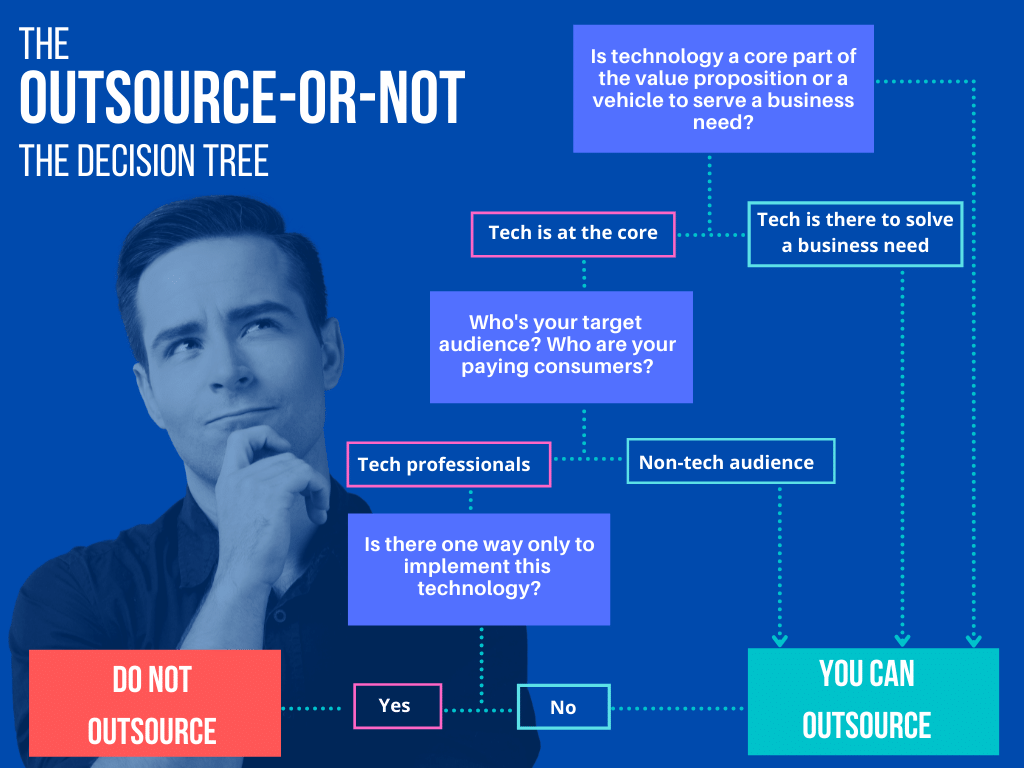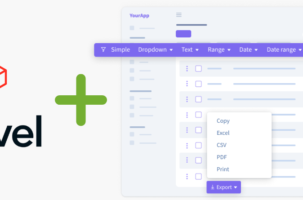In-House vs Outsourcing Software Development : Startup Dilemma
August 18, 2021
Last Updated: December 16, 2021
Is building an in-house team for your next development project worth it? Or should you choose to outsource? Won’t it be too risky? Let’s discuss both options to help you understand what’s better in your case.
When it comes to the dilemma of having in-house developers or outsourcing software development IT resources, the answer is never black or white. There are always pros and cons on both sides.
In this article, we’ll help to learn further which path to follow when you are considering in-house vs outsourcing software development? Go through all listed arguments and decide which side works better for you.
Hetarth Consulting is a leading software development company that provides excellent web app development services utilising cutting-edge technologies. We help startups and enterprises to raise their business value by offering innovative software products. If you have a business idea, then feel free to connect with us anytime.
In House Development
Also known as insourcing, in-house development simply means developing software oor product using the experts you have on hand at your company.
You don’t get any help from the external team; all the developers are employed by you and performing their assigned tasks for you. The term also encompasses using other resources developed within your company.
Assembling an in-house team is a process. It can be long and grueling, but if you know what you’re doing and play your cards right, everything might just work out fine.
You’ll end up with a loyal, committed team you’ll be able to count on for the tasks that come along in the future, since the team already works for you.
In-house Development Reasons
Reason 1: Cultural Fit
It is a team of professionals probably from the same country/city as you are, with the same cultural and language background working within the same organisation.
Developers that work as permanent members of the team tend to pay much more attention to the specific needs of the company.
It means they’re motivated to achieve the best results and bring as much value as possible. It’s easier for in-house developers to integrate with your company’s culture.
Reason 2: Direct Communication
Having the same timezone & working hours and being in the one office allows making the communication process much more comfortable and clear.
Direct face-to-face conversations help avoid misunderstanding and increase effectiveness.
You can communicate easier, implement unexpected changes to the project faster, and eliminate any mistakes caused by miscommunication almost completely.
Reason 3: Full Control
You get to train your team from the ground up, making sure they know exactly how to use the tools at their disposal to develop software in accordance with your company’s philosophy.
You have visibility over the day-to-day progress, know what your employees are working on, and can react promptly if some stumbling blocks are in the way.
Reason 4: Enhanced Security
Your business data and know-how aren’t shared with third parties, and you keep all the knowledge gained during the project inside the company, which minimizes the chance of information leakage.
In-house Development Challenges
Challenge 1: High Costs
All that loyalty to your company and the cultural fit come at a cost. It’s obvious that in-house development is much more expensive than cooperating with a vendor.
The final price makes up for many expenses like rent, taxes, software, hardware, and more. In fact, there are some additional spendings like training for employees, sick days and benefits.
Unlike with outsourcing, this isn’t a one-time payment, either. More employees within your organization mean a greater long-term investment.
Challenge 2: Slow Launch
Hiring one developer takes, on average, 30-35 days, and the task is complicated by high demand for them. You have to compete with other companies and offer better working conditions to attract top talent.
And you not only have to think about getting qualified specialists, but also ensure they match each other by skills and personality to be efficient as a team.
What’s more, they’ll require time to get familiar with each other’s working styles before reaching high productivity levels.
Challenge 3: Staff Turnover
Software developers have a tendency to change the working place quite often. It happens because the demand for talented developers is high and other companies tend to offer better working conditions.
As a result, you may face some challenges with labor and lose time. Finding a new developer is always time-consuming, so your project development can be stopped or slowed down for some time.
Challenge 4: Lack of Tech Talents
Naturally, you can’t gather all the skills and roles in your team. Still, you may need additional competencies as the project unfolds, for example, to solve arising problems or complex tech tasks.
It’ll take longer to get a handle on them with existing resources (and, possibly, investments into additional training) and decrease the speed of development.
Outsourcing Development
The primary driver for outsourcing software development is not just cutting costs. Today, more and more companies are looking to cover complex development needs with outsourcing.
Outsourcing is a good fit for startups without established development and for non-IT enterprises going in for digital transformation, where time and budget don’t favor expanding the IT department with a full-scale development team.
Also, outsourcing helps product companies to speed up time-to-market and scale business by increasing development output.
Outsourcing Development Reasons
Reason 1: Cost-Effective
Combining the cost of infrastructure, hiring expenses, and hourly rates of developers, you can reduce your development cost by up to 60% by outsourcing.
Hence, outsourcing not only saves your time but a huge capital that you can utilise on other important matters to grow your business.
In the case of outsourcing, you can either hire all your resources separately or open up an offshore development center and make it an extension of your in-house team or company.
Reason 2: Short-Term Commitments
It is the most underrated benefit of outsourcing. While you need an expert in a field for a specific project, you probably don’t need him or her permanently.
Outsourcing IT experts on a project basis enable you to get the best only when you need it the most. Let’s understand it with the help of an example.
Sometimes a need may arise to add a specific skill set in between your project, for e.g. just for 2 months. There’s no point to hire a new professional coder to your in-house team permanently.
So, just get in touch with an offshore company that provides IT staff augmentation services to hire developers with specific skills set, and complete your project without spending a huge amount.
Reason 3: Wide Talent Pool
Whether you’re in need of a developer, graphic designer, or any other specialist, you get to choose among the best specialists in the world, free of geographical restrictions. Moreover, you can select destinations that offer a better price/quality ratio than others.
Moreover, people who will work on your project will have access to all the know-how of other people in the software development company. They can consult ideas and solutions with them, which is a massive added value that doesn’t even land on your bill.
Reason 4: Fast Project Launch
Outsourcing app development means that you can get started on building your product almost right away.
You get an assembled team whose members are likely to already know how to work with each other from past projects, so you don’t risk getting inner collaboration difficulties and don’t have to spend time hand-picking each employee.
Reason 5: Proven workflows and processes
Upon turning to a specialized development agency, you can count on well-established development processes and application development experience.
They know how to collaborate efficiently, and use well-defined processes and workflows to boost their productivity and deliver excellent quality of code.
Moreover, a software development agency can provide you with all the roles needed for development – not only software developers, but also a Scrum Master/Project Manager, Quality Assurance Engineers, and UI/UX designers.
Outsourcing Development Challenges
Challenge 1: Lack of Control
While you can always guide your offshore engineers, if your team is not a good listener and competitive, there’s a chance that you will lose control of the project, leading you towards a failed outsourcing relationship.
In the comparison of in-house vs outsourcing, this particular point will always be in favor of the former.
But you can avoid this issue by documenting all your requirements, creating milestones, and project charter. This way you can keep track of the work.
Challenge 2: Communication & Quality Concerns
Most of the communication with your outsourced team will be conducted via email, Slack, or any other means that doesn’t exactly carry the same weight as face-to-face communication.
The issues may arise if your team is located in an entirely different timezone, doesn’t have a reliable internet connection, and hasn’t finalised the preferred medium of communication.
Additionally, you’re more likely to find yourself working with people who don’t speak the same language as you, which would only add fuel to that fire.
But again, it’s easy to avoid these issues by collaborating with a reliable outsourcing partner and finalizing the right communication channels and time for meetings.
Challenge 3: Security and Confidentiality
Sharing business information may possess some risks stemming from the human factor as well as insecure communication channels.
Companies face security and confidentiality risks even in-house. A project shared with outsourced resources becomes risky, taking into account the project’s confidentiality.
Challenge 4: Lack of Commitment
Although it sounds great to have a freelancer developer available only when you need him or her, this developer very likely won’t just sit still and wait for your call. Likewise, he/she will work on other projects as well.
Independent software development companies also work with more clients at a time. Meaning that your project won’t receive 100% of their commitment.
Let’s decide if outsourcing software development is an option for your company.
I’ll simply ask 3 questions:
Is technology the core value proposition? Or is it a vehicle to solve an existing problem?
Take WhatsApp, for instance. Long before they were acquired by Facebook for $19B they relied heavily on outsourced talent.
In the beginning, they offshored their app development to Eastern Europe. As well as the development of their first iOS app.
They used technology to enable users to communicate across both mobile and desktop platforms. Technology is purely a vehicle to solve the user problem; which is why they could outsource successfully.
On the other side of the coin, there is Loopback. A Node.js framework that enables developers to create dynamic end-to-end REST APIs with little or no coding.
In this example technology is proprietary to the value proposition. Outsourcing in this scenario simply wouldn’t work.
Is your product aimed at technology specialists or non-tech consumers?
Generally speaking, if your target audience is tech professionals then it’s advisable to build in-house.
But even then there are grey areas such as Github who were able to outsource, as the technology they were implementing wasn’t unique.
Which leads me to the final question:
Does your product involve a technological “secret sauce” that makes it unique?
If technology is proprietary to your startup, or the way you intend to implement it is unique; you shouldn’t outsource. Just like Loopback.
So even though Github’s target market is developers; neither the underlying technology nor implementation is unique or proprietary.

In The End…
Any decision to outsource a project or keep it within the team is a very personal call and should be made after carefully weighing all pros and cons. Again, It is a vehicle to solve a business need.
Are you looking for an experienced IT outsourcing provider? Drop us a line to build a technical solution that supports your business needs.
Good luck!
Wondering how to build
an exclusive software product for your business?
Discuss your project needs with our architects.








